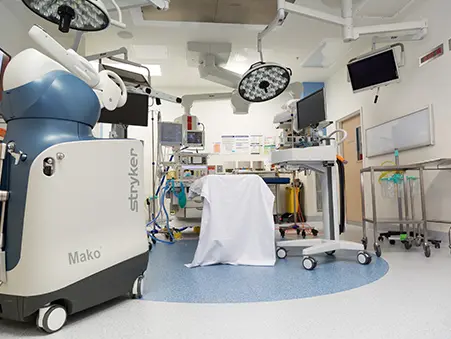Dr. Anoop Jhurani, an expert robotic hip replacement surgeon who has completed over 16,000 surgeries,
is one of the hip replacement doctors in Jaipur, India.
For your hip replacement surgery, why should you choose Dr. Anoop Jhurani?
With expertise in MAKO Robotic knee & hip replacements at Fortis Escort Hospital, Dr. Anoop Jhurani is a well-known orthopedic surgeon in Jaipur, India. With over 20 years of extensive experience in this field, he is one of the hip replacement doctors in Jaipur, India.
The advantage of choosing Dr. Anoop Jhurani for hip replacement surgery is that he makes the surgery so simple for the patients that they don’t fear the procedure. To prepare for the surgery, he also examines the patient’s medical history.
Doctor Anoop Jhurani’s outcomes are exceptional, and he makes utilization of the most recent technology. Dr. Jhurani, who has an outstanding reputation in orthopedics, has successfully completed many thousands of hip replacements. He is a pioneer in this field and has introduced many new procedures in India, including minimally invasive robotic knee and hip surgery.
He had performed live surgery in other countries, like Bangladesh and Vietnam. At national and international forums, he is often an invited speaker.

What are the signs that you will need a hip arthroplasty?
It may be time for surgery if hip pain is negatively affecting your quality of life. The following are some warning signs of diminishing quality of life:
- It affects your capacity to climb or descend stairs.
- It's difficult to get out of a seated position.
- Despite pain medicine, the condition persists.
- Walking makes it worse, even with a cane or walker.
- It disrupts your sleep.
- It's difficult to get dressed.

Initial recommendations for treatment may include painkillers, anti-inflammatories, walking aids, joint injections, and physical therapy. Hip arthroplasty surgery may be required to restore function and enhance the quality of life if the pain and stiffness are not relieved by the previous treatments. For reliable results, consult Dr. Anoop Jhurani for hip replacement surgery in Jaipur, India.
What are the benefits of hip surgery?
Dr. Anoop Jhurani, a hip-replacement specialist, considers that only when other conservative treatments have failed is it necessary to perform a total hip replacement. We've outlined some benefits that you can expect from a total hip replacement so that you understand all the ramifications involved in such a surgical procedure.
- There is a high rate of success
- Long-term results
- Provides pain relief
- Improved hip mobility and performance
- Improved quality of life
- Peace of mind

What is the expected recovery time?
Hip replacement recovery might often take two to four weeks, although every person is different. It depends on several variables, such as how active you were prior to surgery, your age, your diet, any underlying medical concerns, and other aspects of your health and lifestyle. You might recover more rapidly if you reach a particular level of activity before the procedure.
How long will a new joint last after hip arthroplasty surgery?
Improvements in surgical technique and artificial joint materials should make these implants last even longer. If the joint becomes damaged, revision hip replacement surgery can be performed but is more complicated than the original procedure. If you are looking for hip replacement in Jaipur, India, contact Dr. Anoop Jhurani.
FAQ
The following are some conditions that might damage the hip joint and cause hip replacement surgery:
- Osteoarthritis: Osteoarthritis, also known as wear-and-tear arthritis, affects the slippery cartilage that covers the ends of bones and allows joints to swing.
- Rheumatoid arthritis: Is a type of arthritis that affects the joints. Rheumatoid arthritis is a type of inflammation caused by an overactive immune system that erodes cartilage and, sometimes, underlying bone, resulting in damaged and misshapen joints.
- Osteonecrosis: The bone may collapse and distort if there isn't adequate blood supply to the ball area of the hip joint, which could happen because of a dislocation or fracture.
- A hip replacement can be performed under a general anaesthetic (during which you are asleep) or a spinal anaesthetic (during which you are conscious but have no feeling below the waist).
- An epidural, which is like a spinal anaesthetic, is sometimes used.
- A cut (incision) is made into the hip, and the injured hip joint is removed and replaced with an artificial joint or implant.
- The procedure usually takes 1 to 2 hours to complete.
The average stay in the hospital is 3 to 5 days, however, recovery times can vary. Within 6 weeks, you should be able to return to mild activities or office-based jobs. However, because everyone recovers at a different pace, it's best to consult with doctors about when to resume routine activities.
Joint Replacement Surgeon Dr. Anoop Jhurani specialises in hip replacement surgery and has conducted numerous difficult and revision hip replacements. He is equally adept at executing cemented and non-cemented hip replacements with ceramic articulation for long-term success
Click here to book an appointment with Dr. Jhurani for Robotic knee Replacement
